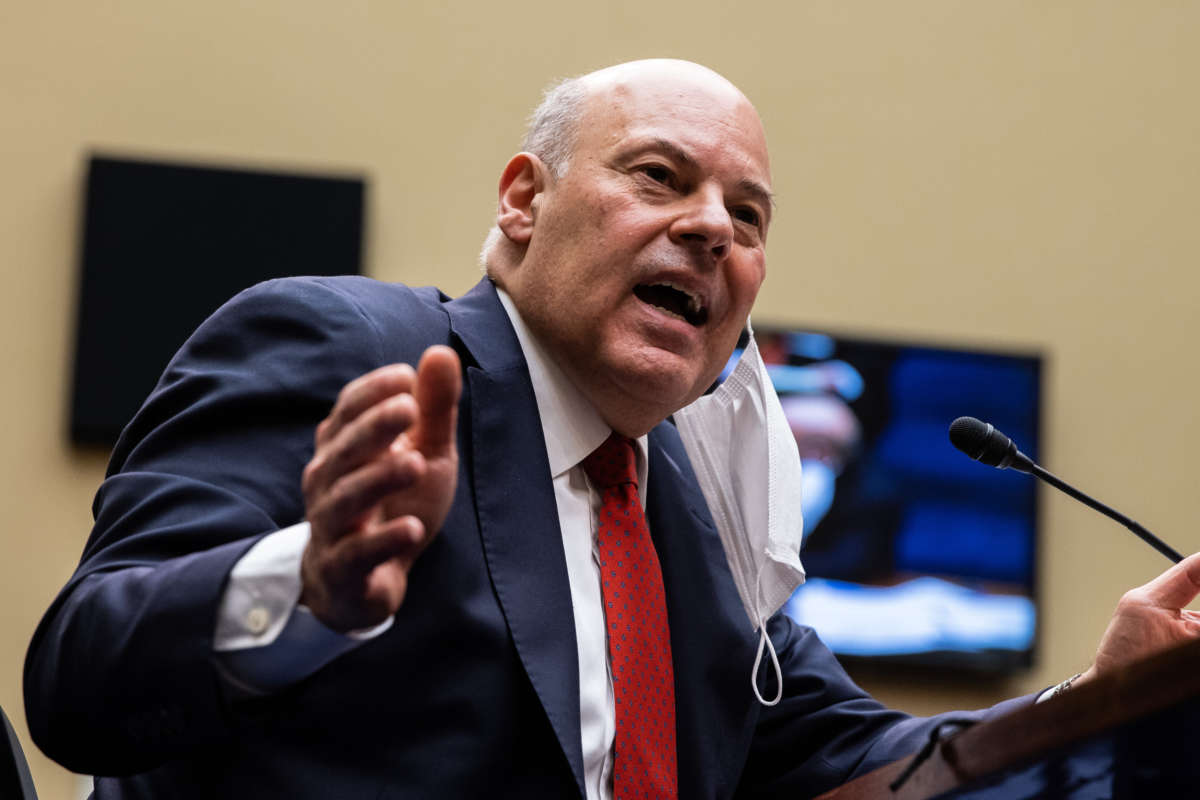Truthout is a vital news source and a living history of political struggle. If you think our work is valuable, support us with a donation of any size.
Recently released documents from the United States Postal Service (USPS) reveal that, in the first months of Louis DeJoy’s tenure as Postmaster General, he had more than a dozen instances of conflicts of interest due to his and other family members’ investments in companies tied to the government agency.
The documents show that DeJoy had failed to divest himself from several companies that had contracts with USPS, including XPO Logistics, a transportation company he used to be the chief executive of and had between $30 million and $75 million in financial interest in when he began serving as postmaster general. In addition to that, DeJoy and his family had notable conflicts of interest with other companies due to investments, including AT&T, CVS, Verizon, Lockheed Martin, Discover Financial Services, IBM, JPMorgan Chase, and more. These companies have government contracts with USPS.
The documents detailing DeJoy’s conflicts of interest — as well as his failure to stay out of decision-making processes in the first few months after he was appointed Postmaster General by former President Donald Trump — were obtained after the nonprofit government watchdog group Citizens for Responsibility and Ethics in Washington (CREW) filed a Freedom of Information Act (FOIA) request and won a court challenge earlier this year requiring USPS to release them.
Federal law requires government employees, including agency heads, to divest from investments worth more than $15,000 in companies that may be affected by their work. Although the documents that CREW obtained do not put a set dollar amount on how much he had, they do show his and his family’s investments exceeded that amount for all 14 companies they were involved with.
The documents also detail how DeJoy didn’t begin the formal process for recusal from decision-making matters related to these companies until August 2020 — months after his initial appointment by the USPS Board of Governors in May of that year. If DeJoy was involved in awarding contracts to his former company XPO Logistics, CREW wrote, he may face criminal liability.
“There was a period of time where the head of the Postal Service was making decisions when there could have been a conflict, and he could have been thinking about his own financial interest, rather than the interest of the Postal Service and the country,” CREW president Noah Bookbinder said. “That’s significant.”
“The United States Postal Service seriously mismanaged Postmaster General Louis DeJoy’s conflicts of interest from the start,” wrote CREW digital director Meghan Faulkner, adding that “USPS’s initial decision to allow DeJoy to recuse from matters involving his former company XPO Logistics rather than divesting from the conflict-creating assets was clearly insufficient.”
The refusal of USPS to be forthright in releasing the information — only releasing it due to a court order, after CREW sued to have the documents made public — also “raises questions about whether they were trying to cover up how badly they mismanaged DeJoy’s conflict,” Faulkner wrote.
DeJoy’s conflicts of interest from the start of his tenure “were handled about as badly as ethics watchdogs had feared,” as he was “allowed to continue holding millions of dollars in shares of a USPS contractor, which was awarded additional contracts before he ultimately divested,” Faulkner added.
The revelations will likely step up efforts by some Democrats in Congress who are calling for DeJoy, a holdover from the Trump administration, to be fired. In addition to his connections to private companies that could benefit from his being postmaster general, DeJoy has been heavily criticized for implementing a number of policies that could cause significant harm to USPS’s reputation, including plans that will make mail delivery considerably slower.
DeJoy can only be fired by the USPS’s Board of Governors. The current chair, Ron Bloom, a Democratic appointment to the board, has signaled he won’t support such action against the current Postmaster General. However, Bloom could soon be replaced by President Joe Biden, as his term is set to expire in December. Biden could, some Democrats hope, replace him with a member who is open to ousting DeJoy.
A terrifying moment. We appeal for your support.
In the last weeks, we have witnessed an authoritarian assault on communities in Minnesota and across the nation.
The need for truthful, grassroots reporting is urgent at this cataclysmic historical moment. Yet, Trump-aligned billionaires and other allies have taken over many legacy media outlets — the culmination of a decades-long campaign to place control of the narrative into the hands of the political right.
We refuse to let Trump’s blatant propaganda machine go unchecked. Untethered to corporate ownership or advertisers, Truthout remains fearless in our reporting and our determination to use journalism as a tool for justice.
But we need your help just to fund our basic expenses. Over 80 percent of Truthout’s funding comes from small individual donations from our community of readers, and over a third of our total budget is supported by recurring monthly donors.
Truthout has launched a fundraiser, and we have a goal to add 200 new monthly donors in the next 24 hours. Whether you can make a small monthly donation or a larger one-time gift, Truthout only works with your support.
